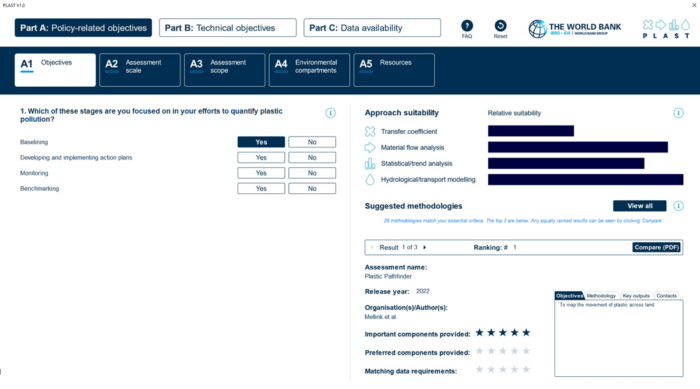Plastic Pollution Assessment Methodologies Suitability Toolkit (PLAST)
The number of plastic pollution assessment methodologies available to users has grown rapidly in recent years. Each method requires a different degree of resources to run and provides varying insights. This can make it confusing for users wanting to apply plastic pollution assessments to understand which method is best suited to their needs and resources.
The Plastic Pollution Assessment Methods Suitability Toolkit (PLAST) is a World Bank project funded by PROBLUE, and developed by a collaboration of the University of Leeds, IUCN, DNA and Deltares. PLAST is designed to aid users in selecting the plastic pollution assessment methodology that is right for their needs and resources.
PLAST is designed to aid users in selecting the plastic pollution assessment methodology that is right for their needs and resources.
Specifically, PLAST aims to:
-
- Collate methodologies available for assessment of plastic pollution
- Characterise assessment methodologies according to an explanatory framework
- Suggest what broad methodological approaches may be best suited based on a user's overall objectives and generalised resources
- Suggest suitable plastic pollution assessment methodologies based on a user's specific technical objectives and data availability.
With a focus on macroplastic waste and quantification methodologies, PLAST is applicable to many user groups as shown below:

In total, PLAST includes over 30 assessment methodologies within its framework. This ranges from methods focused on counting plastic items on beaches right through to global hydrological models mapping plastic movement in the environment. However, despite this variation in methodologies, PLAST is able summarise methods into one of four generalised approaches as shown below.
 Users are required to answer questions in PLAST on their high-level strategies and objectives of a plastic pollution assessment methodology, the specific technical requirements they have, and the data and resources available to them. PLAST uses this information to recommend which of the four generalised methodological approaches may be best suited and rank specific assessment methodologies according to the users criteria.
Users are required to answer questions in PLAST on their high-level strategies and objectives of a plastic pollution assessment methodology, the specific technical requirements they have, and the data and resources available to them. PLAST uses this information to recommend which of the four generalised methodological approaches may be best suited and rank specific assessment methodologies according to the users criteria.
Read more about the science behind PLAST here, or go ahead and download the training material and toolkit here.

